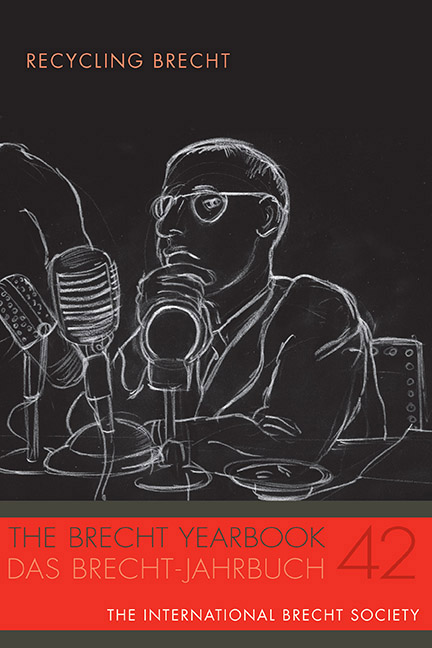Karin Burk. Kindertheater als Möglichkeitsraum: Untersuchungen zu Walter Benjamins “Programm Eines Proletarischen Kindertheaters.” Bielefeld: Transcript Verlag, 2015. 336 pages.
Published online by Cambridge University Press: 09 April 2021
Summary
Karin Burk's monograph Kindertheater als Möglichkeitsraum is a welcome and inspiring investigation into Walter Benjamin's 1929 “Programm eines proletarischen Kindertheaters.” Benjamin's pedagogical manifesto was commissioned by Gerhard Eisler and Johannes R. Becher in cooperation with Asja Lacis for the Karl-Liebknecht Haus, headquarters of the Communist Party in Berlin. It was intended as the conceptual basis for a proletarian children's theater in Berlin, modeled on Lacis's work in Latvia and Russia. Against the background of today's reactionary pedagogical policies with their quantitative, product-, and competition-oriented goals, Benjamin's “Programm” has lost none of its radical and provocative appeal.
Burk extrapolates Benjamin's pedagogical manifesto through an investigation of the two main intellectual influences that shaped his writing of the “Programm”: Latvian theater director, pedagogue, actress, and critic Asja Lacis, on the one hand, and Bertolt Brecht, on the other. Her monograph is divided into three parts: the first is dedicated to Benjamin's exchanges with Asja Lacis between 1924 and 1929; the second turns toward Lacis's work as a director of a children's theater in Latvia and Russia and her background in Russian avant-garde constructivist theater; and the third part offers a detailed reading of Benjamin's “Programm,” which culminates in a comparison to Brecht's concepts of Gestus and the Lehrstück. Burk's explicit interest is in the “Programm” as the conception of a children's theater that creates a space of possibilities [Möglichkeitsraum], allowing children to experience the full range of themselves and the world around them according to their own measure, free of any ideology (8).
Part 1 of Burk's book traces Benjamin's connection with Lacis: their first meetings in Capri and Berlin in 1924, Benjamin's visit in Riga in 1925, their meeting in Moscow in 1926, and their final exchanges in Berlin in 1928–29. Throughout their shared history, Burk demonstrates Lacis's crucial role in Benjamin's turn toward an experimental and praxis-based communism, as well as her impact on his aesthetic developments. In their ongoing discussion, the street stands out as a crucial topos, one that appears in the jointly written essay “Neapel” via the notion of —“porosity,” in Benjamin's Einbahnstraße (dedicated to and written under the influence of Lacis in Riga), as well as in the essay on “Moskau” and the Moskauer Tagebuch featuring Lacis as a key protagonist.
- Type
- Chapter
- Information
- The Brecht Yearbook / Das Brecht-Jahrbuch 42Recycling Brecht, pp. 283 - 288Publisher: Boydell & BrewerPrint publication year: 2018

